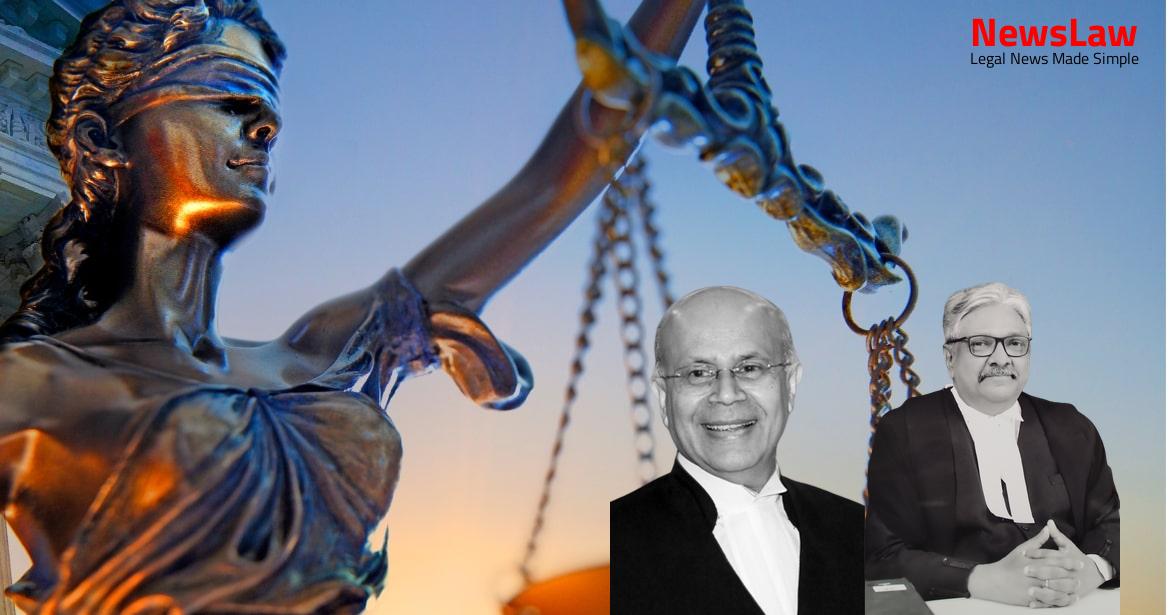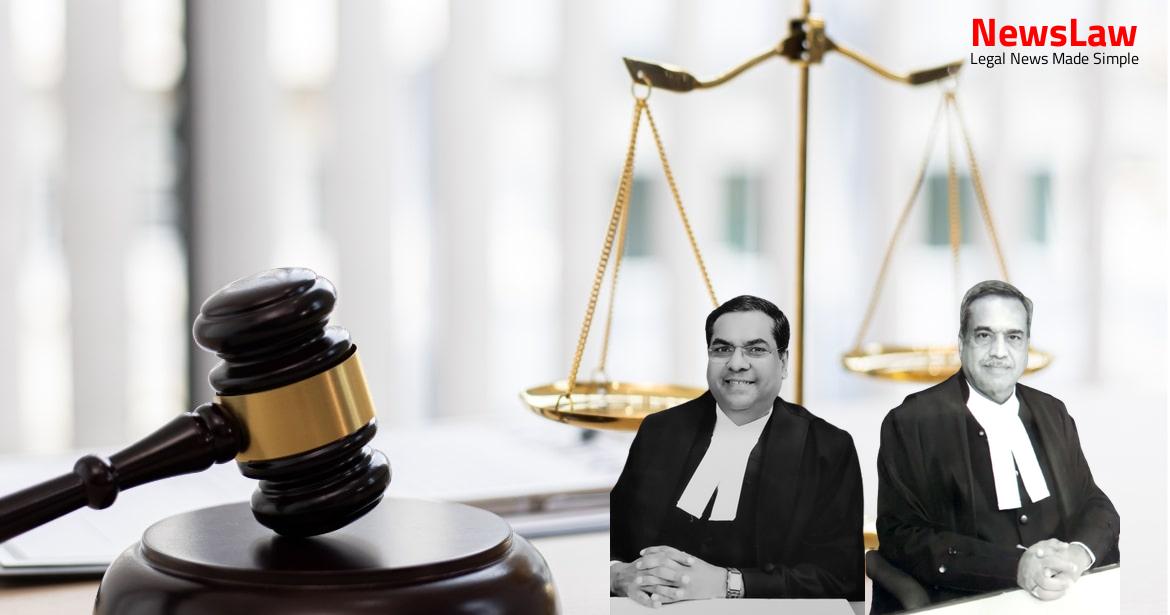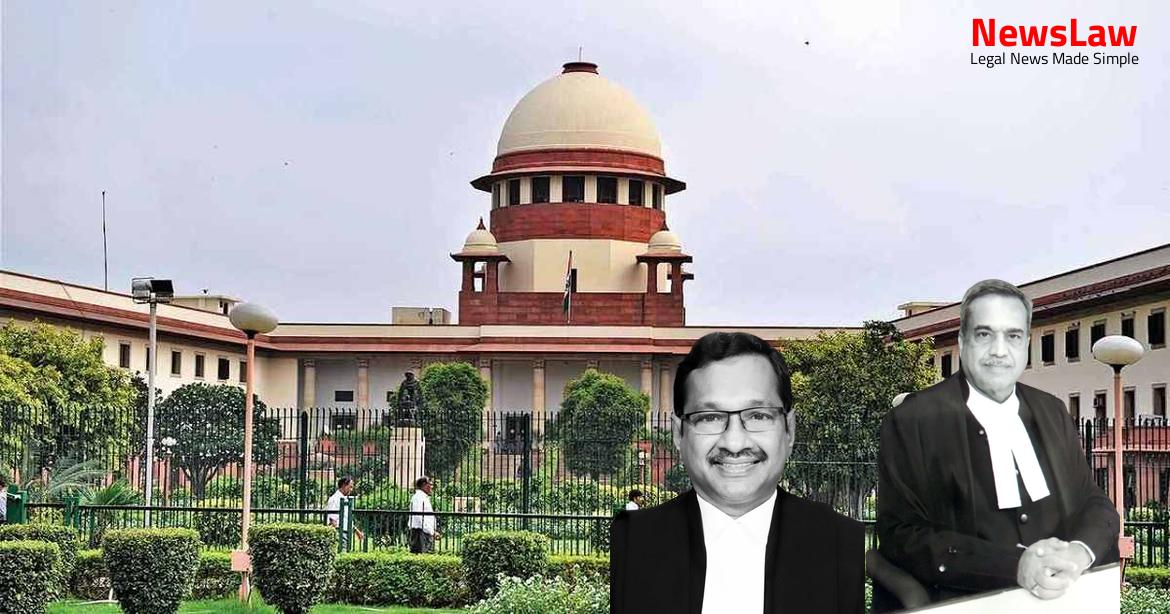The case delves into the intricate realm of judicial review in contractual disputes, where the court navigates the fine line between upholding natural justice and considering public interest. Emphasizing the significance of fairness and prejudice in legal matters, the court’s analysis provides valuable insights into the complexities of balancing competing interests in the legal framework.
Facts
- Agreement entered into between the Corporation and Respondent No.1 on 13.07.2018 for work execution under tender for over a year.
- Concerns raised about doubtful role of Regional Level Officer, accepting Officer, and Managing Director in the process.
- Cancellation of e-tendering process and reissuing of the tender for the same region on 01.06.2018 due to impractical rates.
- Complaints filed regarding financial irregularities causing significant loss to the Corporation.
- Examination of rates received for handling and transport contracts leading to cancellation of tenders and disciplinary actions.
- Observations on failure to conduct market surveys for high rates and irresponsible acceptance recommendations.
- Successful bidders noted with exceptionally high rates above the Scheduled Rates.
- Legal challenges filed against termination of contracts and cancellation orders by Respondent No.1.
- Investigations by Commissioner and findings of the ex-parte enquiry highlighting improper procedures and high rates.
- Recommendations for further actions to recover losses and address irregularities in the tendering process.
- The court ruled that the order terminating the agreement dated 26.7.2019 cannot be sustained in law.
- The order dated 26.7.2019, enquiry report dated 14.6.2019, and the order passed by the Special Secretary dated 16.7.2019 are quashed.
- Arbitrariness is against Article 14 of the Constitution of India, thus the impugned order is considered arbitrary.
- The procedure followed by the respondents was deemed ex parte and under the executive fiats of the Special Secretary, which was unjust.
- The enquiry report was prepared by the Managing Director himself in an ex parte manner without offering the petitioner a hearing.
- The termination of the agreement was without justifiable reason.
- Bias was indicated at the end of the Managing Director in the circumstances.
Also Read: Legal Analysis on Physical Ability in Rape Case
Issue
- Issue of whether a writ petition under Article 226 can be used to enforce a contractual obligation of the State or its instrumentality is being considered.
- Further inquiry into whether the appellant has the standing to raise this matter in a writ petition.
Also Read: Analysis of Transfer of Winding Up Proceedings to NCLT
Arguments
- Petitioner argued that contracts for four centers should not have been entered into at the rates in the 01.06.2018 tender due to a significant disparity with the earlier tender.
- Petritioner argued that the High Court should have considered the financial loss caused by awarding the contract at inflated rates and not interfered with the tender cancellation.
- Petitioner cited case law on natural justice to show that breach of natural justice without resulting in prejudice should not render the order void.
- Petitioner highlighted that the current rates for the same work awarded to the contractor are much lower compared to previous tender rates.
- Petitioner argued against the interference of the writ court in contractual matters and suggested approaching a civil court for appropriate reliefs.
- Facts are not in dispute
- No useful purpose would have been served by issuing a show-cause notice to the petitioner
- Not necessary for the Board to have issued a show-cause notice
Also Read: Judicial Discretion in Contractual Interpretation
Analysis
- Violation of natural justice by not furnishing the enquiry officer’s report to the delinquent employee can result in setting aside the order of punishment if prejudice is established.
- The courts should not mechanically set aside the order of punishment on the grounds of the report not being furnished.
- Prejudice must be a matter of fact or inferred likelihood due to default in procedural fairness.
- The courts have the discretion to balance public/State interest with the requirements of natural justice in certain situations.
- Public law element is present in cases of violation of fundamental procedural provisions with proof of prejudice.
- Writ jurisdiction under Article 226 of the Constitution can be invoked even in contractual matters under certain circumstances.
- The ultimate test is always the same – the test of prejudice or fair hearing in cases of violation of natural justice.
- The Court should weigh conflicting public interests before intervening in writ petitions, especially in contracts with disputed factual questions.
- Not all violations of natural justice automatically nullify the order, the validity is determined by the presence of prejudice.
- The principle of prejudice is crucial in deciding the validity of orders passed in breach of natural justice.
- The concept of natural justice is fundamental and must be considered in cases involving a public law element.
- The breach of natural justice alone may not lead to a finding of prejudice; actual prejudice must be demonstrated in each case.
- Judicial review in contractual disputes is limited, and parties are typically directed to contractual remedies rather than Article 226 of the Constitution.
- The distinction between public law and private law elements in a contract with the State is becoming less defined.
- The Court must determine if prejudice has been caused to the affected party based on the specific facts and circumstances of each case.
- A breach of natural justice does not automatically invalidate orders passed; the presence of real prejudice must be established.
- In cases of disputed facts or complex issues requiring oral evidence, natural justice principles play a crucial role.
- Exceptions exist where natural justice requirements may not apply, especially when the outcome would not have been different with adherence to these principles.
- The Court’s discretion to refuse relief despite a breach of natural justice hinges on the presence of real prejudice to the affected party.
- The principle that a writ petition is not maintainable in contractual matters has been consistently upheld by the Supreme Court.
- Cases such as Noble Resources v. State of Orissa, Food Corp. of India v. SEIL Ltd., Central Bank of India v. Devi Ispat Ltd., and Surya Constructions v. State of U.P. have reiterated this principle.
- The observations in the case of Bridge & Roof Co. are not relevant to the instant appeal as the principles differ.
- The impugned judgment of the High Court was upheld due to a breach of natural justice in the case.
- Prejudice was found to be caused to Respondent No.1.
- No damages will be claimed for the lost period post cancellation of the tender by Shri Dwivedi’s client.
- The earnest money deposit and security deposit made by Shri Dwivedi’s client is ordered to be returned by the Corporation within eight weeks.
Decision
- The appeals arising from SLP (C) 5136 of 2020 and SLP (C) 7351 of 2020 are partially allowed.
- The impugned judgment of the High Court of Judicature at Allahabad dated 11.12.2019 is set aside to the extent indicated by the court.
- In the case of SLP (C) No 7364 of 2020, the facts are distinct as M/s Dharam Raj Singh was the successful bidder for the Tendu (Sonbhadra) region, and their tender award was also cancelled.
- The High Court of Judicature at Allahabad (Lucknow Bench) judgment of 07.01.2020 allowed M/s Dharam Raj Singh’s writ petition challenging the cancellation order, referencing the earlier judgment of 11.12.2019.
Case Title: THE STATE OF UTTAR PRADESH Vs. SUDHIR KUMAR SINGH (2020 INSC 603)
Case Number: C.A. No.-003498-003498 / 2020



